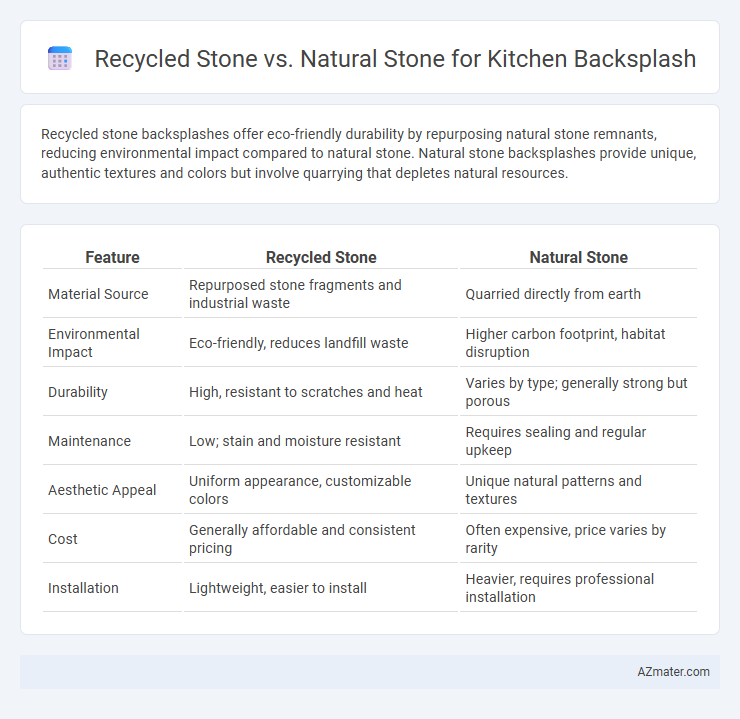Recycled stone backsplashes offer eco-friendly durability by repurposing natural stone remnants, reducing environmental impact compared to natural stone. Natural stone backsplashes provide unique, authentic textures and colors but involve quarrying that depletes natural resources.
Table of Comparison
| Feature | Recycled Stone | Natural Stone |
|---|---|---|
| Material Source | Repurposed stone fragments and industrial waste | Quarried directly from earth |
| Environmental Impact | Eco-friendly, reduces landfill waste | Higher carbon footprint, habitat disruption |
| Durability | High, resistant to scratches and heat | Varies by type; generally strong but porous |
| Maintenance | Low; stain and moisture resistant | Requires sealing and regular upkeep |
| Aesthetic Appeal | Uniform appearance, customizable colors | Unique natural patterns and textures |
| Cost | Generally affordable and consistent pricing | Often expensive, price varies by rarity |
| Installation | Lightweight, easier to install | Heavier, requires professional installation |
Introduction to Stone Backsplashes
Stone backsplashes, engineered from either recycled or natural stone, offer distinct aesthetic and environmental benefits for kitchens. Recycled stone combines fragments of marble, glass, and quartz, creating a sustainable option with unique patterns and reduced environmental impact. Natural stone, such as granite or travertine, provides timeless durability and authentic texture, enhancing kitchen designs with its organic beauty.
What is Recycled Stone?
Recycled stone is a sustainable material crafted from crushed remnants of natural stone, glass, and concrete, bonded with resin or cement to create durable surfaces ideal for kitchen backsplashes. Unlike natural stone, recycled stone offers eco-friendly benefits by repurposing waste materials, reducing landfill impact, and conserving natural resources. It provides similar aesthetic appeal and strength to natural stone while promoting environmental responsibility in kitchen design.
What is Natural Stone?
Natural stone, such as granite, marble, and slate, is a durable, quarried material formed over millions of years through geological processes, prized for its unique patterns and natural beauty. It offers high heat resistance and long-lasting durability, making it an excellent choice for kitchen backsplashes where aesthetics and functionality are essential. Unlike recycled stone, natural stone is a completely organic, non-reconstituted product that maintains its original mineral composition and texture.
Aesthetic Appeal: Recycled vs Natural Stone
Recycled stone offers a unique aesthetic appeal with its varied textures and colors derived from repurposed materials, creating an eco-friendly and distinctive backsplash. Natural stone provides timeless beauty with consistent patterns and rich hues, enhancing luxury and authenticity in kitchen design. Choosing between recycled and natural stone depends on desired visual impact, sustainability goals, and maintenance preferences for the kitchen backsplash.
Durability and Maintenance Compared
Recycled stone offers comparable durability to natural stone, resisting scratches and heat effectively while being less prone to staining due to its denser, non-porous surface. Natural stone, though highly durable, often requires regular sealing and more meticulous maintenance to prevent damage from moisture and acids commonly found in kitchen environments. Both materials can maintain aesthetic appeal over time, but recycled stone generally demands less upkeep, making it a practical choice for busy kitchens.
Environmental Impact and Sustainability
Recycled stone kitchen backsplashes significantly reduce environmental impact by diverting waste from landfills and lowering the demand for quarrying, preserving natural landscapes. Natural stone extraction consumes substantial energy and resources, contributing to habitat disruption and carbon emissions during mining and transportation. Choosing recycled stone supports sustainable building practices by utilizing reclaimed materials, reducing overall carbon footprint, and promoting circular economy principles in kitchen design.
Cost Differences and Budget Considerations
Recycled stone for kitchen backsplashes typically costs 20-40% less than natural stone, making it a budget-friendly option for homeowners seeking eco-friendly materials. Natural stone varieties like granite or marble can range from $50 to $100+ per square foot, while recycled stone often falls between $30 and $60 per square foot, including installation. Budget considerations should also factor in durability and maintenance costs, as natural stone may require more frequent sealing and care compared to recycled alternatives.
Installation Process and Requirements
Recycled stone kitchen backsplashes typically require more precise cutting tools and adhesives compatible with composite materials, as their composition can vary significantly from natural stone. Natural stone, such as granite or marble, demands careful sealing and may need heavier-duty mounting hardware due to its density and weight. Both options benefit from professional installation to ensure durability, but recycled stone often allows for easier customization and quicker installation times thanks to its lighter weight and uniform thickness.
Design Versatility and Customization
Recycled stone offers remarkable design versatility and customization for kitchen backsplashes, allowing for unique textures, colors, and patterns that are difficult to replicate with natural stone. Natural stone, such as marble or granite, provides timeless elegance and organic variations but is limited in color diversity and uniformity compared to recycled options. Customized recycled stone blends can incorporate various materials and pigments, enabling tailored aesthetics that suit modern or eclectic kitchen designs more effectively than traditional natural stone.
Which Stone is Best for Your Kitchen Backsplash?
Recycled stone offers eco-friendly benefits by using repurposed materials, providing unique textures and often lower costs compared to natural stone, which is prized for its durability and timeless aesthetic in kitchen backsplashes. Natural stone options like granite and marble resist heat and moisture effectively, making them ideal for kitchen environments where functionality and style are critical. Choosing the best stone for your kitchen backsplash depends on prioritizing sustainability and budget with recycled stone or valuing long-lasting quality and classic beauty with natural stone.

Infographic: Recycled stone vs Natural stone for Kitchen backsplash
 azmater.com
azmater.com